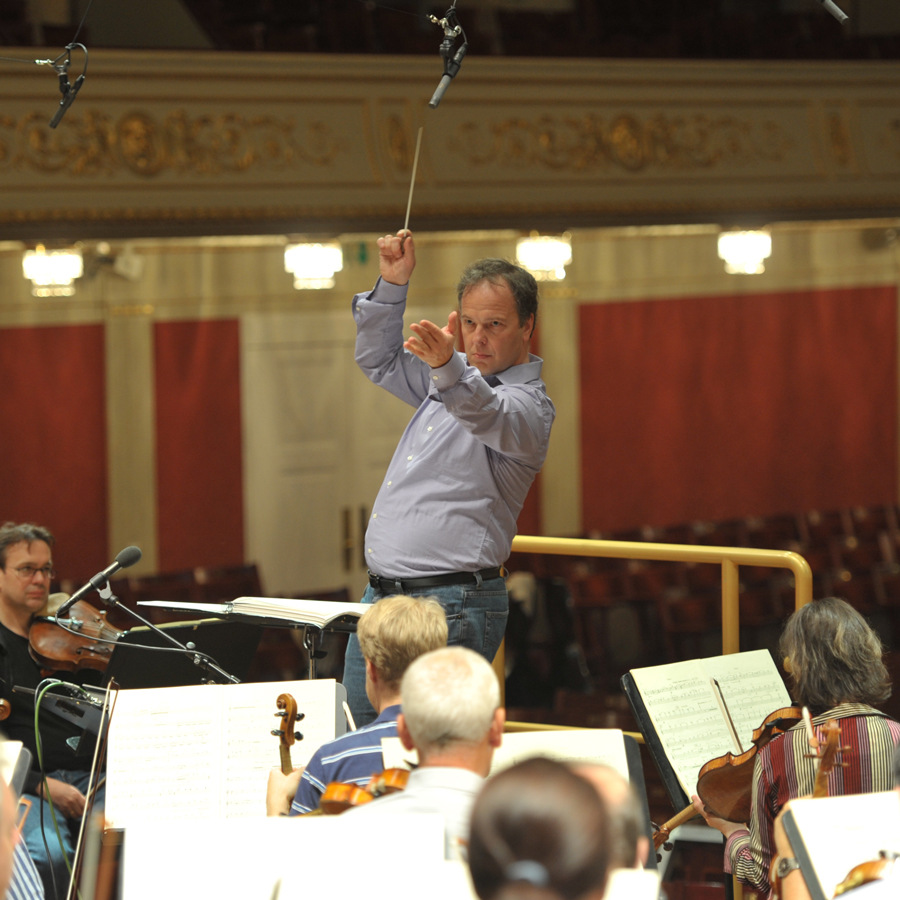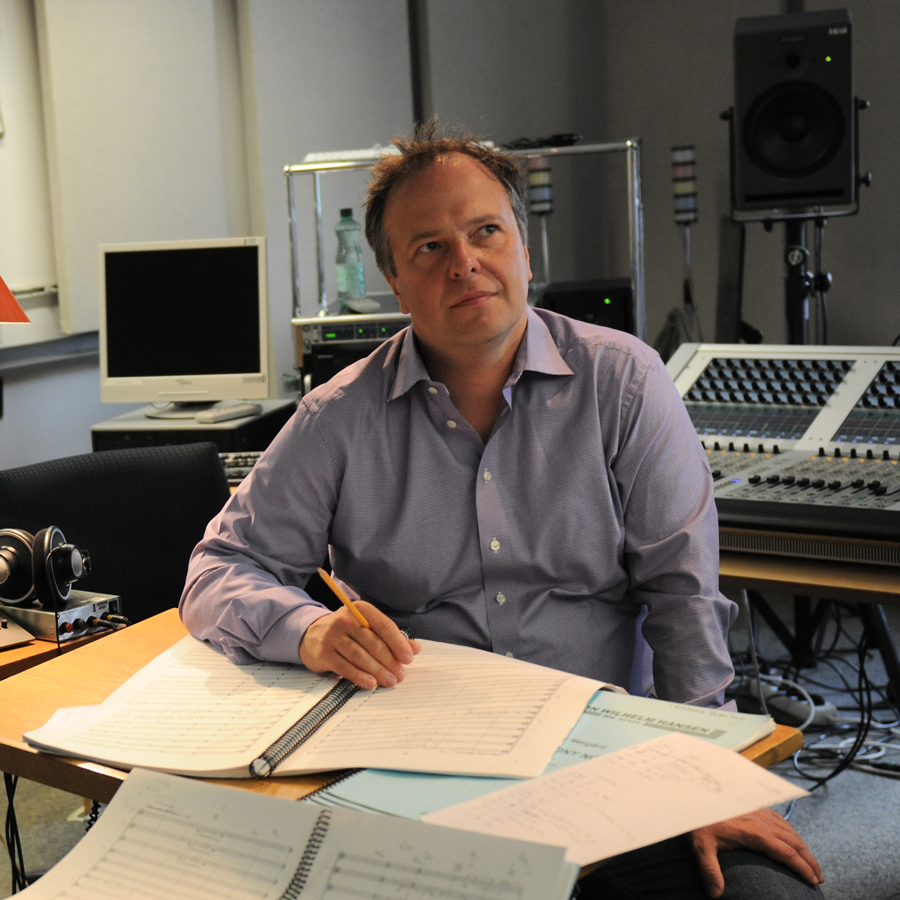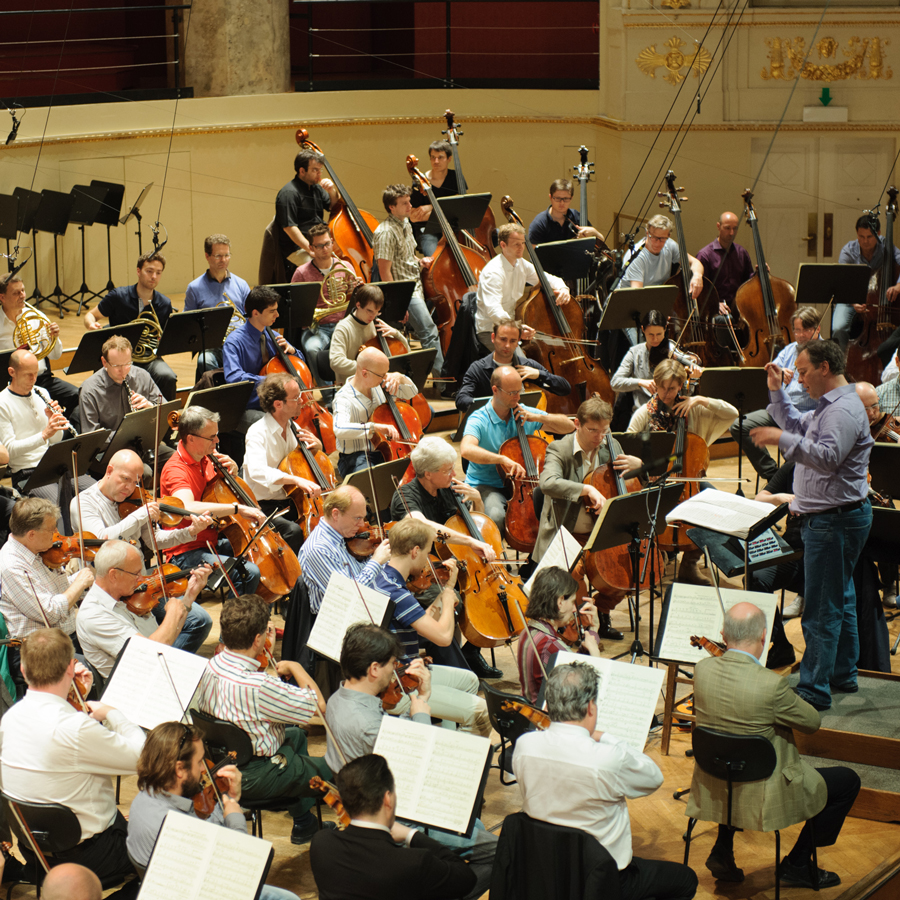Session report – Oramo records Nørgård's symphonies in Vienna
Richard Whitehouse
Friday, July 18, 2014
Richard Whitehouse looks on as the Vienna Philharmonic step out of their comfort zone with Nørgård's First and Eighth symphonies

What do Finnish conductor Sakari Oramo, Danish label Dacapo and the Vienna Philharmonic have in common? On May 24-26 last year, it was Per Nørgård, the leading contemporary Danish composer whose Eighth Symphony was recorded following performances at Vienna’s Konzerthaus as part of that city’s annual Festwochen. Although his music has an international following, Nørgård is an unknown quantity in Austria and not least to the VPO. However, as Oramo (who first worked with the orchestra in an acclaimed programme of Sibelius’s First, Fifth and Seventh symphonies two years ago) told me during a break in the recording sessions, the players had responded to the challenge of the Danish composer’s music with real alacrity.

‘Nørgård has a singular view on the relationship of the musical past to the present, making it impossible to render his music from an overly conservative or radical viewpoint. The Vienna Philharmonic grasped this from the outset, though it helped we’d given the First Symphony just before, as its ancestry in Sibelius made sense to an orchestra familiar with the Finnish composer, and from there to the Eighth Symphony was a logical if far from predictable step.’

‘Predictable’ is the last word that could be levelled at Nørgård’s vast (over 400 published works) and multi-faceted output, at the core of which are eight symphonies that range from the tangibly Sibelian aura of his Sinfonia Austera (Symphony No 1) to the subtle and allusive Classicism of his Eighth – commissioned by the Helsinki Philharmonic and premiered by that orchestra in 2012 to mark the composer’s 80th birthday. The present recording is part of an ambitious schedule that has also seen Dacapo embark on a cycle of Nielsen symphonies with the New York Philharmonic, and was set in motion by Danish producer Preben Iwan.
‘I’d long wanted to work with the Vienna Philharmonic on music outside the repertoire for which that orchestra is renowned. Dacapo had begun recording the Nørgård symphonies [the Third and Seventh appeared five years ago with the Danish Radio Symphony and Thomas Dausgaard] and was keen to make this cycle an international affair, so when I heard that the VPO was interested in recording with Sakari, the basis of the project quickly fell into place’.
How did the players react to recording music with which it was previously unfamiliar? ‘With total commitment and absolutely no hint of being fazed by what was on the page. I think the VPO is conscious of being at the centre of the Austro-German tradition and was keen to show how versatile its music-making can be. This has come across in the flexibility of the musicians during the rehearsals and recording, when they were happy to work at length on those details Sakari knew need clarifying so that the bigger picture could come into focus. Certainly those who think the VPO fights shy of new music are in for a surprise when they hear this disc’.
Nørgård’s Eighth Symphony may be only a third the length of the average Mahler symphony, but its intricacy of texture and depth of expression are no less evident. How did Oramo view the recording process? ‘Perhaps the most striking aspect of this piece is that most of the large orchestra is playing at any one time, yet the dynamic levels are almost always restrained and often hushed – giving the impression of music that communicates a great deal to the listener as it remains almost out of earshot. In this sense it's alluring to the ear as well as absorbing for the mind. Those who were present at the Konzerthaus concerts seemed to appreciate this.’
Working with Iwan was engineer Mats Engström, whose knowledge of the North European symphonic tradition is considerable. ‘I think it’s a great pity when composers from one country take so long to gain hearings elsewhere. Even now, the symphonies of Sibelius are regarded equivocally in Austria and Germany, with those of Nielsen almost unknown. Yet when audiences have had the chance to hear these works, they can relate them directly to the wider symphonic tradition, and this in turn provides a context for the music being written today. Once you’ve made those links, both the content and expression of pieces which had previously unfamiliar start to make sense and you begin to appreciate and then enjoy them.’
Certainly the recording session which followed the second concert suggested that the Vienna Philharmonic musicians had enjoyed working on this singular music, with individual players keen to listen to the playbacks and also offer suggestions as to how they might improve on specific details or passages. Iwan and Engström both expressed satisfaction with the way these sessions had gone, while Oramo was no less pleased with performances and recording.
‘Too often these days there’s the absence of a "risk factor" in live performance, and this in turn can leave the audience feeling unmoved or disappointed. While I couldn’t claim that these hearings of Nørgård’s Eighth Symphony have established his music in Vienna, I feel that they’ve created a platform for further performances. Certainly the players with whom I’ve spoken directly have expressed their regret that Nørgård was previously unknown to them and also the hope that he’ll soon be featured again on their schedules. For my part, I’m now very much looking forward to tackling further of his orchestral works in the future.’
The only real misfortune concerning this project was that the composer himself was not available to attend either of the performances or the sessions, Nørgård having been ill for some months beforehand. That said, he has for the most part been lucky in his interpreters back to his earliest successes of the 1950s, and it is hard to believe he will not be other than delighted with what he encounters on the disc. The combination of Sakari Oramo, Dacapo and the Vienna Philharmonic has certainly proved a fruitful partnership on this occasion: a benchmark, perhaps, for international collaboration on further projects of this importance.
Nørgård's Symphonies Nos 1 and 8 performed by the Vienna Philharmonic Orchestra with Sakari Oramo on Dacapo is out now. Read the Gramophone review in the August issue (on sale from July 22) and in the Reviews Database here.
Listen to a track in the Gramophone Player below:










